Posts Tagged ‘content’
Description of ‘content’ Tag:
Thursday, October 13th, 2011
Updating a website refers to the addition or modification of content as well as the actual design and layout of the website. Stale websites can quickly discourage web visitors and are one of the major reasons behind high bounce rates. A bounce occurs when a visitor quickly views the page that they have landed on and then decides to leave the site rather than exploring its other web pages. 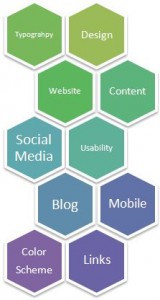
How often should you be updating your website:
So, how often should you be updating your website? There aren’t any set expectations for how often a website should be updated. However it is suggested that you perform updates as frequently as possible in order to prevent your website from looking dated and losing your valuable web traffic. It is recommended that you try to update your website at least 1 to 2 times a month. These weekly or monthly updates should be designed for only adding or refreshing content unless the entire website’s design is fatigued. As long as you develop a site that is both visually appealing and easily accessible then your primary updates should focus solely on your content.
When asked, most webmasters and search engine marketers agree that the more you update your content the more impact it will have on your Search Engine Optimization. Updating is especially helpful when it comes to blog content. Continuously adding new blog posts leads to more of your pages being indexed and draws in more visitors and potential customers.
Reasons for Updating Your Website:
- Updating provides your visitors with a visually appealing user experience.
- Updating your website establishes fresh and relevant content.
- Updating helps your website get indexed more often.
- Updating attracts new traffic.
- Updating increases rank and influences other websites to link to your website.
Tips for Updating Your Website’s Design:
… Read the rest
Tags: content, Design, seo, update, website, website content, website design
Posted in Web Development, Web Hosting, Web Tips | No Comments »
Thursday, September 29th, 2011
An RSS feed or a “really simple syndication” is a media format that pushes frequently changed web content to subscribers. RSS feeds are mostly used to provide updated content such as blog post, news headlines, audio, or video. RSS channels are read using an RSS reader, software that can be web, desktop, or mobile based. RSS feeds allow web viewers to access content that has its presentation and formatting stripped away. In essence, an RSS feed removes useless clutter and leaves only relevant and easy to understand content. 
RSS feeds allow users to stay informed by receiving the latest news and website updates. In order to access RSS content, a user must first subscribe to a websites RSS feed. Most websites will have an RSS feed subscription button displayed prominently on their home page or blog. To subscribe, simply click on the RSS icon and select the RSS reader that you wish to use (If using Firefox you can also open the bookmarks menu and click “Subscribe to this page”). After subscribing to a feed, the reader will routinely check for new content. The RSS reader provides an interface where users can view the latest content from their favorite websites, all in one location.
The Benefits of an RSS Feed:
RSS feeds can be beneficial for both web publishers as well as web visitors. The following are some of the benefits for each.
Publishers:
- Improves Search Engine Optimization
- Enables Faster Web Crawling and Indexing
- Publicizes your new content automatically
- Helps Reach New Audiences
- Free Marketing and Easier to market than sending out email campaigns
Visitors:
- Provides the latest content and updates all in one place
- Saves time because the content is delivered to you
- Easy to subscribe and unsubscribe
How to use it to help your Internet Marketing:
One of the benefits of an RSS feed is that it helps with SEO. The following are a few examples for how an RSS feed can… Read the rest
Tags: content, Feed, feeds, Really simple syndication, rss, RSS Feed, RSS Feeds, subscribe
Posted in Blog Hints, Internet Marketing, Web Tips | No Comments »
Friday, September 16th, 2011
Constructing a website for a business is only the first part of attracting your online customers. There are many factors that determine your position on the search engine results page, one of them being the quality and quantity of your inbound links. In order to increase traffic and gain a good web rank your website should have a significant amount of backlinks. These backlinks should connect with valuable, authoritative, and industry related websites. Gathering backlinks should be a top SEO priority because without them it can be extremely hard to move up in the search engine results or generate more website visibility.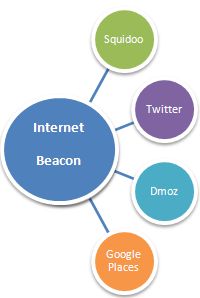
There are a number of ways to build backlinks to your webpages, one of which we mentioned in our previous blog entry, “Reciprocal Linking”. Reciprocal or two way linking is when two websites agree to exchange links with each other. However linking doesn’t always have to be mutual, this type of linking is called one way linking. The following list provides some popular sources and methods of obtaining one way links.
Create Superior Content and Resources:
In addition to creating a visually appealing and easy to use website you will also need to have high quality content or linkbait to draw the attention of visitors. This content is used to influence visitors to link back to your website by sharing your content. When other websites share your content on their website they will typically link back to the original source.
- Create 101 articles that describe the basics of your industry related subject.
- Create Top 10 or 100 lists.
- Lists the top professionals from your industry.
- Create an infographic that displays industry information in an intriguing and exciting way.
- Create free helpful online tools or downloadable software programs.
Start a Blog:
A blog is a handy instrument when it comes to gaining momentum and popularity over the Internet. A Blog has many benefits for example it is an excellent way to reach existing clients and find new… Read the rest
Tags: backlinks, blog, content, inbound links, Links, search engines, Social Media
Posted in Backlinks, Internet Marketing, Search Engine Optimization SEO | 2 Comments »
Friday, September 2nd, 2011
What is an Infographic? An infographic is a pictorial representation of specific data or knowledge. Infographics can be a great way to showcase information on a particular subject area and can prove to be a good source of link value. Infographics have the ability to transform plain material into interesting and exciting web content. Over the past few years the value of infographics has grown tremendously because many have begun to recognize the potential they have to connect with their target audience.
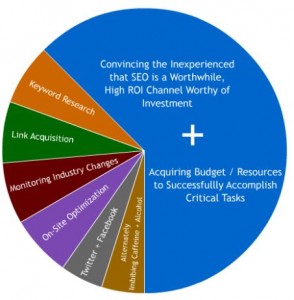
from http://www.seomoz.org/blog/4-essential-seo-infographics, September 2011
Link value or link juice is a term often used in Search Engine Optimization and refers to the amount of value that the search engines like Google attribute to a website or link. Link juice is assigned to web pages and is dispersed throughout a website based on how well your website is optimized. The more links and most importantly the more high quality links a website has directly translates into the more link juice a website is likely to have.
When talking about Links it is important to understand some important fundamentals. Total links quantity indicates the total number of links that your website or webpage possesses. The merit of these links can vary which brings us to the linking source. The linking source describes who is linking to your content and how credible or trustworthy they are. The sites that have a higher rank will pass on more value than those with a lower web rank. Even though the websites with a higher rank may provide more value it is also important to have diversity among your links. It’s ok to have links from lower ranked pages as long as there is a balance between link values.
Another major factor with links is anchor text. The anchor text is the keywords and descriptions other websites use when linking to your content. Accurate anchor text is essential for good SEO. You want something that describes your content well and not something like “Click… Read the rest
Tags: anchor text, backlinks, content, infographics, link juice, link value, linkbait, Links, seo, seo infographics
Posted in Backlinks, Internet Marketing, Search Engine Optimization SEO, Social Media Marketing | No Comments »
Thursday, July 28th, 2011
Meta tags are special HTML tags that contain information or Meta data that is readable by browsers, search engines and other programs. Meta data is commonly referred to as “data about data”. It is documented information about a specific set of data and is essentially used to describe the contents of a webpage. Meta tags only contain page information, they do not change the appearance of the page. These tags are placed in the heading section of HTML code and are only visible to users when viewing the source page. The following is how Meta tags appear in a website’s source code.
<HEAD>
<TITLE>How to Create a Meta Tag</TITLE>
<META name =“description” content=”Everything you want to know about Meta Tags”>
<META name =”keywords” content=”Keyword 1, Keyword 2, Keyword 3, Keyword 4”>
</HEAD>
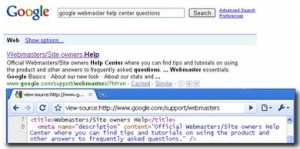
from http://googlewebmastercentral.blogspot.com/2009/09/google-does-not-use-keywords-meta-tag.html , July 2011
Are Meta Tags helpful? Meta tags are usually used for Search Engine Optimization and are thought to help web crawlers index your pages more accurately. Although at one time Meta tags held tremendous value for website ranking they no longer carry the same importance. Over time, less and less weight has been assigned to Meta tags due to their manipulation and user abuse. Eventually websites began to perform keyword stuffing (excessive use of keywords) and listed irrelevant information in their Meta tags to try to attract and mislead traffic to their pages. As users caught on to the black hat SEO techniques for Meta tags the search engines started to divert their attention and place more emphasis on actual content. Shifting their focus allowed the search engines to evaluate web pages appropriately based on visible content rather than depending on a Meta tag to deliver accurate information.
Meta tags no longer play the same critical role in SEO as they once did, but that doesn’t necessarily mean that they are all worthless. It is believed that certain Meta tags can still generate greater… Read the rest
Tags: content, keyword, Meta, Meta Tag, Meta Tags, search, search engine, tag, tags, webrank
Posted in Search Engines, Web Development | No Comments »
Friday, April 22nd, 2011
Search engines take into consideration a large number of factors when assigning a rank to a website. Although there are a number of factors that are obvious or specifically identified as ranking factors, the majority of the ranking criteria are kept private. Search engines avoid publicizing the exact pieces of the Search Engine Optimization puzzle that they use to determine a rank because it would most likely lead to a massive overflow of irrelevant search results.
Search Engines recognize that if all the sites on the Internet knew the characteristics that they use, then every site would be able to rank higher. Providing this information would make it too easy for website and go against their main goal which is to provide users with the most relevant and useful search results. Clearly expressing the measurements that are used to rank a website would prevent a relevant site from standing out amongst the other results and could potentially place a higher rank on a page that is worst or is less relevant to a user.

Search Engines use both on-the page as well as off-page elements to assign a rank. On-page factors usually focus on internal site structure including keyword use and internal linking where as an off-page aspect considers who you link to, how you link to them, and the popularity or relevance of your links. Some of the factors that are known or thought to be important to ranking well in search engines include:
- Keyword in the pages Title Tag.
- Appropriate and descriptive anchor text of Inbound Links.
- Global Link Popularity of Site.
- Age of domain.
- Link Popularity or equity within the internal link Structure.
- Relevance of an inbound link to the site and the text surrounding that link.
- Keyword use throughout the body copy.
- The popularity or authority of the website providing an inbound link.
With that being said, one of the major factors that search engines do directly distinguish as being harmful to a Websites rank is Duplicate Content. Duplicate Content is best described as a portion or… Read the rest
Tags: content, duplicate, duplicate content, inbound link, link, rank, search, search engine, website
Posted in Internet Marketing, Search Engine Optimization SEO, Web Tips | No Comments »
Friday, April 1st, 2011
 The number of users who access the Internet using their mobile device continues to grow each and every day. Approximately more than half of the people who use the Internet access it regularly from a mobile device. As new mobile devices are introduced and as mobile web browsers advance mobile web browsing further solidifies itself as a permanent fixture in our everyday lives. When considering how many or your potential customers are accessing the Internet via their mobile phone you should be asking yourself, is your website mobile friendly? The number of users who access the Internet using their mobile device continues to grow each and every day. Approximately more than half of the people who use the Internet access it regularly from a mobile device. As new mobile devices are introduced and as mobile web browsers advance mobile web browsing further solidifies itself as a permanent fixture in our everyday lives. When considering how many or your potential customers are accessing the Internet via their mobile phone you should be asking yourself, is your website mobile friendly?
The advances of mobile devices has made tremendous progress however many sites that are not optimized for the mobile web often get lost in translation and present a less than desirable user experience. Due to the quick advancements and development it is probably only a matter of time till mobile browsing can offer an experience equal to that of regular Internet browsing. So, another important question to consider would be is the benefit of mobile optimizing worth the effort or would it make more sense to wait a year or two until mobile browsing possess the same technology and capabilities of traditional Internet browsing?
Most of the time if a user is accessing your website from a mobile device there is a higher urgency to make a purchase or perform a critical action such as finding directions to your brick and mortar store or acquire some kind of contact or customer support. I think it is clear that depending on the type of business and the needs of the customers it is probably worth the effort or at the very least wouldn’t hurt to make your website a mobile companion. The following are suggestions to assist you in making your website more compatible with the mobile web environment as opposed to creating an additional website solely for mobile users.
- Test your sites mobile compatibility
Before you make any adjustments to your site you should first test it and see if any changes are necessary. To do this you can navigate to your site on any mobile device or download mobile
… Read the rest
Tags: Browsing, content, internet, link, Mobile, mobile device, Mobile Web, user, web, web browsing
Posted in Mobile Web, Search Engine Optimization SEO | 2 Comments »
Friday, October 22nd, 2010
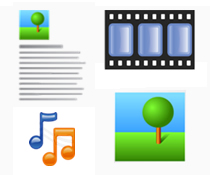 Hello there! Welcome to the Internet Beacon’s awesome weblog. If you’re here for SEO tips for small businesses, you’ve come to the right place. Hello there! Welcome to the Internet Beacon’s awesome weblog. If you’re here for SEO tips for small businesses, you’ve come to the right place.
Keeping people coming to your site is key in this industry. You don’t want them to visit once and then forget about you. That doesn’t do you any favors and it keeps your website from gaining influence on the web. Now, Search Engine Optimization (SEO), is something we here at the Internet Beacon specialize in. However, once you get people to your site, you need to give them a reason to keep coming back. Now, this where your content comes into play. The only thing is, don’t let your content get stale. There are three major forms of communication used today in the blogosphere.
Audio – Listen Up
Today’s Internet user is doing multiple things at once. They might be shopping while listening to the news. Or checking their bank account while playing their favorite music. The common thread here is that the audio provides the user with content, without demanding their absolute attention. Providing content like podcasts or even streaming sound clips can get your audience’s interest, while still giving them freedom.
Video – Catch their Eye
Now, if you really want someone’s attention, video is a great way to do it. Video allows for massive amounts of data to be exchanged. The combination of audible and visual means creates an opportunity to share tons of information with your users. Some great video ideas are reviews or answers to popular questions about your products/services.
Written Word – Worth “X” Amount of Pictures
Ah, the classic standby. Text was the first form of communication on the Web and is easiest to post. A solid blog or post can inform users of your products and services, all while representing it an easy to handle format. PC processing power doesn’t come into play and text is easily managed on mobile devices as well.
-Josh
Internet Beacon

Tags: content, Presentation, Repeat Customers, seo, Video
Posted in Browser, Search Engine Optimization SEO, Web Development | 1 Comment »
Friday, July 9th, 2010
 Hey, Josh here from the Internet Beacon. We are a Search Engine Optimization (SEO) firm located in Reisterstown, Maryland. What we do, SEO, is a subcategory of Internet Marketing. Similar to traditional advertising, SEO is all about getting your Brand out there. In this case, we´re working to get your website in front of customers through search engines like Google, Yahoo, and Bing. For more quick, useful information, check out our SEO Answers page, our SEO Glossary, and our blog posts on SEO. Hey, Josh here from the Internet Beacon. We are a Search Engine Optimization (SEO) firm located in Reisterstown, Maryland. What we do, SEO, is a subcategory of Internet Marketing. Similar to traditional advertising, SEO is all about getting your Brand out there. In this case, we´re working to get your website in front of customers through search engines like Google, Yahoo, and Bing. For more quick, useful information, check out our SEO Answers page, our SEO Glossary, and our blog posts on SEO.
How do the big search engines see your websites content?
Google, and most search engines, use robots to sort through your page for content. These are not actual robots, but computer programs with a single purpose, to crawl your website. Crawling means taking the time to read all the code that makes up your page. This is largely HTML, but other code like Flash is partially recognized. What is important here is tight design to aid the robots in reading your site. You can also assist them via scripting, but that is something best saved for professionals like your SEO specialist.
Is Flash a factor?
Yes. Google can read a little bit of Flash, but HTML and other standard code is where they get most of their data. Be careful when using Flash, as overuse will result in difficulties with PageRank and other methods of promotion. The same goes with splash pages, or intro pages, for your website. That may have been cool in the 1990s, but today people want to get to your content as soon as possible. There’s no need to make a separate page to welcome them.
How do images come into play?
Without ALT tags for your images search engines won’t know what to do with them. As clever as Google’s robots are, they aren’t discerning all the contents of your pictures. The “ALT” tag allows for users to put captions in the code for their images. This way, if there are visitors to the site who are visually impaired, they will still know what is going on on your page.
-Josh
Internet Beacon

Tags: content, Google, HTML, Internet Marketing, Popularity, Robots, seo
Posted in Search Engine Optimization SEO, Web Development | No Comments »
Thursday, June 3rd, 2010
 Howdy, Josh here from the Internet Beacon. We´re a Search Engine Optimization (SEO) firm located in Reisterstown, Maryland. What we do, SEO, is a subcategory of Internet Marketing. Similar to traditional advertising, SEO is all about getting your Brand out there. In this case, we´re working to get your website in front of customers through search engines like Google, Yahoo, and Bing. For more quick, useful information, check out our SEO Answers page, our SEO Glossary, and our blog posts on SEO. Howdy, Josh here from the Internet Beacon. We´re a Search Engine Optimization (SEO) firm located in Reisterstown, Maryland. What we do, SEO, is a subcategory of Internet Marketing. Similar to traditional advertising, SEO is all about getting your Brand out there. In this case, we´re working to get your website in front of customers through search engines like Google, Yahoo, and Bing. For more quick, useful information, check out our SEO Answers page, our SEO Glossary, and our blog posts on SEO.
You´ve got a website. Congratulations! Now it´s time to put some content on there. You know that the more you have, the better your site will do online. This is a mixture of Google´s PageRank system, pages indexed by sites like Yahoo! and Alexa, as well as the actual content on your page. This is where a lot of people are tempted to build giant sites that are really just the same page or two duplicated over and over again. This is a terrible idea.
There are many reasons why you should not simply bombard a web server with the same pages. First, no one is going to like your website. I know that search engines are important, but they are not the be-all/end-all of the Internet. The fact of the matter is, PEOPLE are going to look at your website. If they hate it because it´s 1,000 page of the same thing, no one will ever come back. In fact, they´ll likely tell their friends to steer clear of your site.
Second, search engines are not stupid. Think about it. You´re relying on software to make your website more popular; do you think they don´t know what´s going on? I can answer that: they do. Google, like all search engines, searches the text on your page. Therefore, they have checks in place to make sure that your content is not duplicated. Avoid duplication when building your site. The big guys know what you´re up to.
That´s all for this week. Check back again next week for more tips on web development and SEO.
-Josh
Internet Beacon
SEO Maryland

Tags: content, engines, Google, internet, marketing, page, search, search engines, seo, site, website
Posted in Internet Marketing, Search Engine Optimization SEO | No Comments »
|
![]()